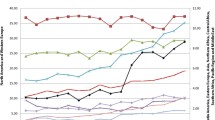Abstract
We proposed an original research design based on applied Scientometrics and frame analysis to assess how a citation was made to sustain arguments in documents on public health policies subjected to online public consultation from 2003 to 2008 in Brazil. So we built on citation studies to create a new scale to estimate why a scientific work was mentioned in our sample of 278 citations. We found that government branches make citations mainly to value their arguments, not to explain them, and that contributors mainly make citations in such a way that could discourage others from engaging in digital democracy.




Similar content being viewed by others
References
Ahmed, T., et al. (2004). Highly cited old papers and the reasons why they continue to be cited. Part II. The 1953 Watson and Crick article on the structure of DNA. Scientometrics, 61(2), 147–156.
Brambilla, S. D. S., Vanz, S. A. S., & Stumpf, I. R. C. (2006). Mapeamento de um artigo produzido na UFRGS: razões das citações recebidas. Enc. Bibli: R. Eletr. Bibliotecon. Ci. Inf., Florianópolis, n. esp, 1º sem.: 195–208.
Chong, D., & Druckman, J. N. (2007). A theory of framing and opinion formation in competitive elite environments. Journal of Communication, 57(1), 99–118.
Coleman, S. (2004). Connecting parliament to the public via the internet: Two case studies of online consultations. Information, Communication and Society, 7(1), 1–22.
Curtis, S. (2008). How can we address health inequality through healthy public policy in Europe? European Urban and Regional Studies, 15(4), 293–305.
Druckman, J. N., & Nelson, K. R. (2003). Framing and deliberation: How citizens’ conversations limit elite influence. American Journal of Political Science, 47(4), 729–745.
Gamson, W. A., & Modigliani, A. (1989). Media discourse and public opinion on nuclear power: A constructionist approach. The American Journal of Sociology, 95(1), 1–37.
Goffman, E. (1986). Frame analysis. Boston: Northeastern University Press.
Gross, K., & D’Ambrosio, L. (2004). Framing emotional response. Political Psychology, 25(1), 1–29.
Kahneman, D., & Tversky, A. (1984). Choices, values, and frames. American Psychologist, 39(4), 341–350.
Leydesdorff, L. (2001). The challenge of Scientometrics: The development, measurement, and self-organization of scientific communications. Boca Raton, FL: Universal-Publishers.
Nelson, T. E., & Oxley, Z. M. (1999). Issue framing effects on belief importance and opinion. The Journal of Politics, 61(4), 1040–1067.
Nowotny, H. (2000). Transgressive competence: The narrative of expertise. European Journal of Social Theory, 3(1), 5–21.
Paul, D. (2000). In citing chaos: A study of the rhetorical use of citations. Journal of Business and Technical Communication, 14(2), 185–222.
Von Lengerke, T. (2004). Perception and health behaviours: A multilevel analysis and implications for public health psychology. Journal of Health Psychology, 9(1), 157–175.
Wright, S., & Street, J. (2007). Democracy, deliberation and design: The case of online discussion forums. New Media and Society, 9(5), 849–869.
Acknowledgments
We want to thank the Brazilian Ministry of Education and its funding agency CAPES (Coordenação de Aperfeiçoamento de Pessoal de Nível Superior) for supporting this research with the Prodoc Program.
Author information
Authors and Affiliations
Corresponding author
Rights and permissions
About this article
Cite this article
Hayashi, M.C.P.I., Rothberg, D. & Hayashi, C.R.M. Scientific knowledge and digital democracy in Brazil: how to assess public health policy debate with applied Scientometrics. Scientometrics 83, 825–833 (2010). https://doi.org/10.1007/s11192-009-0125-8
Received:
Published:
Issue Date:
DOI: https://doi.org/10.1007/s11192-009-0125-8




